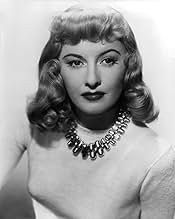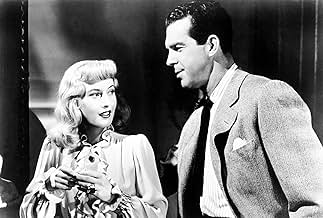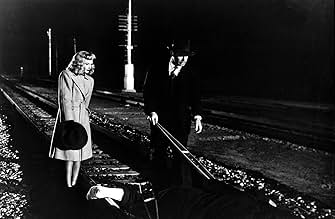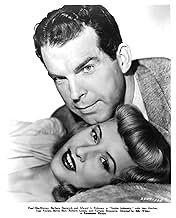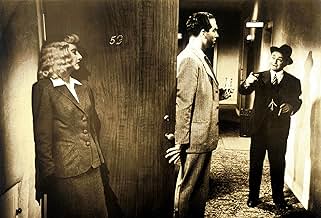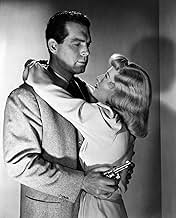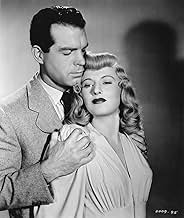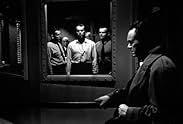Um agente de seguros se deixa convencer de um esquema de assassinato e fraude, o que desperta a suspeita de um investigador.Um agente de seguros se deixa convencer de um esquema de assassinato e fraude, o que desperta a suspeita de um investigador.Um agente de seguros se deixa convencer de um esquema de assassinato e fraude, o que desperta a suspeita de um investigador.
- Direção
- Roteiristas
- Artistas
- Indicado a 7 Oscars
- 5 vitórias e 9 indicações no total
Lev Abramov
- Stage Hand
- (não creditado)
James Adamson
- Pullman Porter
- (não creditado)
John Berry
- Bit Part
- (não creditado)
Raymond Chandler
- Man Reading Magazine Outside Keyes' Office
- (não creditado)
Edmund Cobb
- Train Conductor
- (não creditado)
Kernan Cripps
- Conductor
- (não creditado)
Betty Farrington
- Nettie - Dietrichsons' Maid
- (não creditado)
Bess Flowers
- Norton's Secretary
- (não creditado)
- Direção
- Roteiristas
- Elenco e equipe completos
- Produção, bilheteria e muito mais no IMDbPro
Resumo
Reviewers say 'Double Indemnity' is acclaimed for Billy Wilder's direction, standout performances by Fred MacMurray, Barbara Stanwyck, and Edward G. Robinson, and its pioneering film noir style. The intricate plot, dark themes, and exploration of human nature are often lauded. Voice-over narration, sharp dialogue, and unique cinematography heighten its suspense. Despite minor pacing issues and plot inconsistencies, its impact on the noir genre and cinema is significant. The lead characters' chemistry and moral complexities are noted for enhancing dramatic tension.
Avaliações em destaque
"I liked the way that anklet bit into her leg. I wanted to see her again, up close, without that silly staircase between us."--Walter Neff, after meeting Phyllis Dietrichson This is Fred MacMurray like you've never seen him before. He's edgy and sharp, and amoral, although he hides it well from his boss. Barbara Stanwyck's astounding performance set the standard for bad girls in Film Noir for years to come. I love this film because it is a perfect example of how the censorship of the time made it so that filmmakers had to get the sexiness across in a subtle way. This movie is undeniably sexy, and there's not a single 'love scene' in it!
This is one of the best-liked classic films of all time and I am among that large group of fans as well.
Few movies have ever had dialog this entertaining.....at least the conversations between Barbara Stanwyck and Fred MacMurray. I think it's a big appeal to this movie, except to younger folks who look at it as "cheesy."
I read the book, Double Indemnity written by James Cain, and was surprised that the film's snappy dialog was not in it. This is one of the rare times when the movie was far better than the book. That's not a shock after you find out that literary giant Raymond Chandler and Hall Of Fame director Billy Wilder combined to write the screenplay,
For a murder/suspense story, there is very little action, almost none, yet there are no boring lulls. The three main actors - Stanwyck, MacMurray and Edward G. Robinson, are what make this so good.
MacMurray's narration is fun to hear as he tells the story in flashback, from the beginning by dictating into an old Dictaphone to his co-worker Robinson. The latter is almost mesmerizing in his performance, the way he delivers his lines. He can even make a speech about something as boring as insurance and still keep you riveted to the screen.
Stanwyck was no sex symbol (at least to me) but she looked great here in the most seductive of 1940s clothing and, like Robinson, has a distinctive voice and accent that keeps your attention.
This film was the inspiration for the 1980 movie, "Body Heat," starring William Hurt and Kathleen Turner. That, too, was a very, very good movie....but not many films are in the class of this one.
Few movies have ever had dialog this entertaining.....at least the conversations between Barbara Stanwyck and Fred MacMurray. I think it's a big appeal to this movie, except to younger folks who look at it as "cheesy."
I read the book, Double Indemnity written by James Cain, and was surprised that the film's snappy dialog was not in it. This is one of the rare times when the movie was far better than the book. That's not a shock after you find out that literary giant Raymond Chandler and Hall Of Fame director Billy Wilder combined to write the screenplay,
For a murder/suspense story, there is very little action, almost none, yet there are no boring lulls. The three main actors - Stanwyck, MacMurray and Edward G. Robinson, are what make this so good.
MacMurray's narration is fun to hear as he tells the story in flashback, from the beginning by dictating into an old Dictaphone to his co-worker Robinson. The latter is almost mesmerizing in his performance, the way he delivers his lines. He can even make a speech about something as boring as insurance and still keep you riveted to the screen.
Stanwyck was no sex symbol (at least to me) but she looked great here in the most seductive of 1940s clothing and, like Robinson, has a distinctive voice and accent that keeps your attention.
This film was the inspiration for the 1980 movie, "Body Heat," starring William Hurt and Kathleen Turner. That, too, was a very, very good movie....but not many films are in the class of this one.
Double Indemnity begins with a car speeding on a dark, rainy night. This begins the classic film noir plot. Billy Wilder directs a steamy and grabbing film. Billy Wilder pulls this film together with an awesome cast, perfect lighting and an amusing script. Fred MacMurray plays Walter Neff, an unsuspecting insurance salesman. He is unsuspecting in the sense that he is unaware of what the femme fatale' is going to put him up to. Barbara Stanwyck plays the femme fatale', Phyllis Dietrichson, a manipulative housewife who will stop at nothing to get what she wants.
The film begins in present day giving insight into Walter's current plight. Walter Neff gives the voice over as the plot unfolds. It starts in the present time allowing the audience to know what crime has happened without the interesting details to support it. This is an interesting twist to the common film noir plot. Knowing the crime at hand keeps the audience hungry for those details. Walter is the victim of the beautiful woman who manipulates him into pulling off a murderous insurance fraud scam. Walter is an impeccable insurance salesman and Phyllis, in some ways, forces him into providing her with what she needs. Phyllis is the typical femme fatale' who has no problem in using others to get what she wants.
Throughout the film Walter is completely enamored by Phyllis. Walter could have coined the pet name baby' with his fondness towards Phyllis by calling her that throughout the film. He is easily distracted by her beauty and evil charm. He seems to be entranced by Phyllis's ankle bracelet, so much that he mentions it numerous times. This allows the audience to feel the sexual tension between the two. Phyllis, on the other hand, shows the audience that she can use and abuse anyone who gets in her way. While believably attracted to Walter, Phyllis keeps him hopping to fulfill her needs. She pulls him in and handles him like a puppet. She is the epitome of the film noir genre's femme fatale'.
Barton Keyes, played by Edward G. Robinson, is Walter's co-worker and friend at the insurance company where he works. Barton closely investigates all insurance claims that come across his desk. While at one time Walter assuredly agreed with this practice, once Barton starts to unravel the mystery behind Mrs. Dietrichson's insurance claim, we begin to see just how nervous and paranoid Walter is. Walter then begins to see Phyllis in a whole new light. Barton plays the integral part by piecing together details that are thrown around throughout the film. This keeps the tension high for the filmgoer. These details are pieced together perfectly through to the end.
Double Indemnity has the perfect plot with the perfect cast. Walter and Phyllis' attraction are tasty and the crime is wonderfully puzzling. Double Indemnity is the true film noir giant.
The film begins in present day giving insight into Walter's current plight. Walter Neff gives the voice over as the plot unfolds. It starts in the present time allowing the audience to know what crime has happened without the interesting details to support it. This is an interesting twist to the common film noir plot. Knowing the crime at hand keeps the audience hungry for those details. Walter is the victim of the beautiful woman who manipulates him into pulling off a murderous insurance fraud scam. Walter is an impeccable insurance salesman and Phyllis, in some ways, forces him into providing her with what she needs. Phyllis is the typical femme fatale' who has no problem in using others to get what she wants.
Throughout the film Walter is completely enamored by Phyllis. Walter could have coined the pet name baby' with his fondness towards Phyllis by calling her that throughout the film. He is easily distracted by her beauty and evil charm. He seems to be entranced by Phyllis's ankle bracelet, so much that he mentions it numerous times. This allows the audience to feel the sexual tension between the two. Phyllis, on the other hand, shows the audience that she can use and abuse anyone who gets in her way. While believably attracted to Walter, Phyllis keeps him hopping to fulfill her needs. She pulls him in and handles him like a puppet. She is the epitome of the film noir genre's femme fatale'.
Barton Keyes, played by Edward G. Robinson, is Walter's co-worker and friend at the insurance company where he works. Barton closely investigates all insurance claims that come across his desk. While at one time Walter assuredly agreed with this practice, once Barton starts to unravel the mystery behind Mrs. Dietrichson's insurance claim, we begin to see just how nervous and paranoid Walter is. Walter then begins to see Phyllis in a whole new light. Barton plays the integral part by piecing together details that are thrown around throughout the film. This keeps the tension high for the filmgoer. These details are pieced together perfectly through to the end.
Double Indemnity has the perfect plot with the perfect cast. Walter and Phyllis' attraction are tasty and the crime is wonderfully puzzling. Double Indemnity is the true film noir giant.
I've now seen this movie 14 times in 25 years, at all times of the year, in all moods, sober or not etc - but always at night. I recorded my copy off TV in 1987 so I can only imagine what a remaster would do for it. With an atmosphere thick enough to cut with a knife it never fails to engross and enchant me, and although it's been dated for 40 years or more still seems relevant and watchable today. TV, answer phones, recordable CD/DVD, memory sticks and the internet have all come between us and yet I can still watch Fred MacMurray speaking into a Dictaphone without a qualm. Who wears a hat in California nowadays? Who buys beer whilst driving! Lift attendants have gone but I can still believe in Charlie working and laughing away in the garage past 11 at night.
Woman and man agree to murder woman's husband but on the way to the cemetery they face grilling by insurance company. I think everything has been said before on the IMDb - by those who think it's one of the best films ever made! To those who simply think the main problem is that it's dated I wish you could see the TV commercials that dug into DI back in '87 - what a hoot - and compare. I've just noticed the print TCM UK is showing in 2005 is lip-synced out, very wobbly Rosza music track, fading and ageing fast - worse than my 1987 video tape (maybe logically). They're supposed to be encouraging people to enjoy the classics but they won't do that with such inferior screening copies. Dear TCM UK, this is an impressive iconic film - it deserves a billion dollar remaster authorised by the Library of Congress, not repeatedly trotting out unimpressive cheap worn dupes to fill those 2 hour slots.
Everything about DI from the acting, production, direction, and music is superbly dignified and is as "close to perfection" as human beings are probably allowed to get with this form of Art - especially with the more limited technology at their disposal in '44. When most films from now are long forgotten and dated DI will still be getting re-runs on TV and art-house cinemas - God and remasters willing - that is the fact of it.
Fortunia Bonanova certainly was fortunate to have appeared in bit parts in 2 of the best films ever made - Citizen Kane the other.
Woman and man agree to murder woman's husband but on the way to the cemetery they face grilling by insurance company. I think everything has been said before on the IMDb - by those who think it's one of the best films ever made! To those who simply think the main problem is that it's dated I wish you could see the TV commercials that dug into DI back in '87 - what a hoot - and compare. I've just noticed the print TCM UK is showing in 2005 is lip-synced out, very wobbly Rosza music track, fading and ageing fast - worse than my 1987 video tape (maybe logically). They're supposed to be encouraging people to enjoy the classics but they won't do that with such inferior screening copies. Dear TCM UK, this is an impressive iconic film - it deserves a billion dollar remaster authorised by the Library of Congress, not repeatedly trotting out unimpressive cheap worn dupes to fill those 2 hour slots.
Everything about DI from the acting, production, direction, and music is superbly dignified and is as "close to perfection" as human beings are probably allowed to get with this form of Art - especially with the more limited technology at their disposal in '44. When most films from now are long forgotten and dated DI will still be getting re-runs on TV and art-house cinemas - God and remasters willing - that is the fact of it.
Fortunia Bonanova certainly was fortunate to have appeared in bit parts in 2 of the best films ever made - Citizen Kane the other.
Author James M. Cain virtually created a new genre with his extra-tough, sin-blackened, and sex-drenched novels--and they were so successful with the public that not even 1940s Hollywood could resist. The result was three of the most famous films of that decade: MILDRED PIERCE, THE POSTMAN ALWAYS RINGS TWICE, and DOUBLE INDEMNITY. Although POSTMAN is probably the better film, INDEMNITY is the most famous--possibly due to the story's truly psychotic edge, which is given full life by Barbara Stanwyck in one of her most celebrated performances.
Like POSTMAN, INDEMNITY offers the story of a married woman who plots with her lover to murder her husband. Given MacMurray's typically "good guy" image, I didn't expect to believe him in the role of Walter Neff in the role of skirt-hungry Walter Neff--but MacMurray's performance is exceptionally good here, and all the more effective because it so completely unexpected. But while MacMurray has most of the screen time, it is really Stanwyck and Edward G. Robinson who dominate the film. Stanwyck is truly memorable here, and gives us a woman who seems at once sexed-up and completely frigid, at once completely natural and absolutely artificial. It is a remarkable and often disturbing effect. Robinson, who endured decades of type-casting, is equally good as the blustery, slightly comic, and absolutely honest insurance man whose job it is to ferret out suspicious claims; it is largely due to his performance, which gives the film a moral center, that we are able to buy into the otherwise off-beat performances that drive the action.
This was one of director Billy Wilder's first major hits, and he deserves considerable credit for making the weird elements of the story work as a whole, keeping the film smartly paced, and heaping it up with atmosphere. So influential that its impact would be difficult to over-estimate, DOUBLE INDEMNITY is a touchstone for the entire film noir genre. Recommended.
Gary F. Taylor, aka GFT, Amazon Reviewer
Like POSTMAN, INDEMNITY offers the story of a married woman who plots with her lover to murder her husband. Given MacMurray's typically "good guy" image, I didn't expect to believe him in the role of Walter Neff in the role of skirt-hungry Walter Neff--but MacMurray's performance is exceptionally good here, and all the more effective because it so completely unexpected. But while MacMurray has most of the screen time, it is really Stanwyck and Edward G. Robinson who dominate the film. Stanwyck is truly memorable here, and gives us a woman who seems at once sexed-up and completely frigid, at once completely natural and absolutely artificial. It is a remarkable and often disturbing effect. Robinson, who endured decades of type-casting, is equally good as the blustery, slightly comic, and absolutely honest insurance man whose job it is to ferret out suspicious claims; it is largely due to his performance, which gives the film a moral center, that we are able to buy into the otherwise off-beat performances that drive the action.
This was one of director Billy Wilder's first major hits, and he deserves considerable credit for making the weird elements of the story work as a whole, keeping the film smartly paced, and heaping it up with atmosphere. So influential that its impact would be difficult to over-estimate, DOUBLE INDEMNITY is a touchstone for the entire film noir genre. Recommended.
Gary F. Taylor, aka GFT, Amazon Reviewer
Você sabia?
- CuriosidadesAuthor James M. Cain later admitted that if he had come up with some of the solutions to the plot that screenwriters Billy Wilder and Raymond Chandler did, he would have employed them in his original novel.
- Erros de gravaçãoWhen Walter first kisses Phyllis, a wedding ring can be seen on Walter's hand. Fred MacMurray was married, and the ring was not noticed until post-production.
- Citações
[last lines]
Walter Neff: Know why you couldn't figure this one, Keyes? I'll tell ya. 'Cause the guy you were looking for was too close. Right across the desk from ya.
Barton Keyes: Closer than that, Walter.
Walter Neff: I love you, too.
- Cenas durante ou pós-créditosOpening credits are shown over a silhouette of a man on crutches, walking toward the camera.
- ConexõesEdited into Cliente Morto Não Paga (1982)
Principais escolhas
Faça login para avaliar e ver a lista de recomendações personalizadas
Detalhes
- Data de lançamento
- País de origem
- Central de atendimento oficial
- Idioma
- Também conhecido como
- Pacto de sangre
- Locações de filme
- 6301 Quebec Drive, Hollywood Hills, Los Angeles, Califórnia, EUA(Dietrichson house)
- Empresa de produção
- Consulte mais créditos da empresa na IMDbPro
Bilheteria
- Orçamento
- US$ 927.262 (estimativa)
- Faturamento bruto mundial
- US$ 21.026
- Tempo de duração1 hora 47 minutos
- Cor
- Proporção
- 1.37 : 1
Contribua para esta página
Sugerir uma alteração ou adicionar conteúdo ausente




